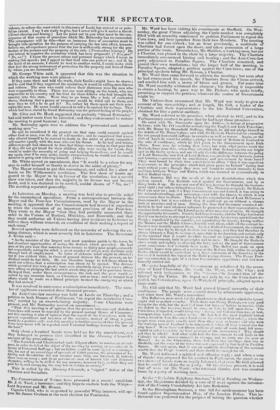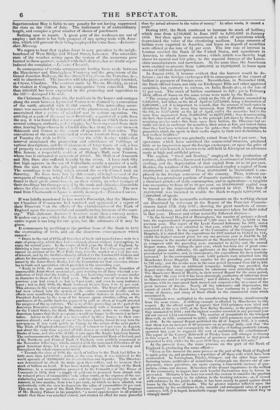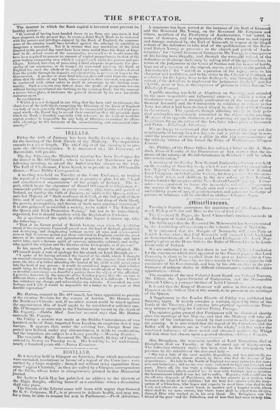At the " Rai:shire Epiphany Sessions," held at Reading on
Wednes- day, the Maaistrates decided by a vote of 37 to 21 against the introduc- tion of the County Constabulary Act into Berkshire.
At the Birmingham Sessions, a true bill for misdemeanour has been found against Superintendent May, of the London Police. This in- dictment was preferred for the purpose of raising the question whether Superintendent May is liable to any penalty for not having suppressed the riots on the 15th of July. The indictment is of extraordinary length, and occupies a great number of sheets of parchment.
Nothing new to report. A great part of the workmen are out of employ ; and there is hut little prospect of any spring trade with Ame- rica, which will prevent their being employed for some time.—Leicester- shire Mercury.
We regret to hear that typhus fever is very prevalent in the neigh- bourhood of West Bridge and Wharf Street, Leicester. The miserable state of the weather acting upon the system of the numerous poor located in these quarters, coupled with their distress, has no doabt super- induced the complaint.—Lciecster Chronicle.
In consequence of certain arrangements having been made between the Manchester and Birmingham Company and the proprietors of the Grand Junction Railway, the line through Congleton, the Potteries, &c., will be abandoned. The junction will take place, as originally intended, at Crewe, Cheshire. The contract made by Messrs. Bleakley, to erect the viaduct at Congleton, has in consequence been cancelled. More than 200,000/. has been expended in the promoting and opposition to the bill !—Liverpool Chronicle.
On Christmas Eve, about six, the residents in the houses and cottages along the coast between Lyme and Seaton were alarmed by a convulsion of the earth, attended with fearful sounds. This astounding occur- rence was succeeded by reiterations of the plucnomena, and it was soon ascertained that a emirs; of mischief was in serious operation. On arriving at a part of the coast near Dow laird, a quarter of a mile front the sea, it was found that a Loan, portion of land, on which there were several cottages, orchards, and a coppice, had been separated from their sites, leaving huge chasms in a lateral dires tits.' along the (mast between Sidmouth and Seaton to the extent of upwards of lotr miles. The convulsions of the earth contiimed at various intervals from the night of Tuesday the 24th to Fritts,: s seeing the 27th; having within that interval occasioned the prostrmition and subsidence of buildings of various descriptions, and the di ;placement of large tracts of soil, a loss of property to a considerable extent, among the suGrers by which is Mrs. Inman, a respectable r,aiillent of Bishop's Hull, near Taunton, whose loss is estimated at upwards of 2,000L Mn'. Mika of Ax month and Mrs. Dare also suffered heavily by the event. A huge rock fifty feet high appears in the sea off enlverhole, nearly a quarter of a mile from the spot where the pritmipal scene of mischief presents itself.
The soundings Wirre being taken around the new ly-f mimed rock on Saturday. No lives were 1.)st by this event ; although several of the
occupants of cottages, 'Who had left holies to spend their Christmas Eve, found to tlieir great astonishment, on their return, no oilier vestiges of their dwellings but those preseated by the roofs and ellimnies discernible above the chat ms in which th,iv habitation, were engull'ed. Tim new road front Charmouth to Lyme in utterly destroyed.—Iburdsof Courier.
If was briefly mentioned in last week's Postscript, that the Manches- ter Chandler of Commerce lied received and approved of a r4ort of their Directors " on the Abets of' the administration of' the Bank of England upon the commercial and manufacturing interests of the coins' try." "Ihis elaborate doe tinnier deserves more than a cursory notice. It makes out a ease which the :huffs will find it difficult to rebut. The entire report is too long for our space, hut the substance of it may be given. It commences by ascribing to the profuse issue of the Bank in 1835 the overtradiug of 1836, and all the disastrous cousequenees which ensued- " Down to the end of 1835, all branches of trade and mannlimetures were in a State of prosperity, which they had continued, almost without interruption, to enjoy for several years. In the mitirse of that year, the liank of England, la' throwing a large amount of money. list I fir the rist Inffia COMpally and ad- vanced on account of the !Vest India loan, lel,' the markel at a very low rate ofinterest, and by the ftumiiities thereby ill titled to the Immulon1611-brolters and others for discounting enormous sure: of American acceptances, mind bills re- issued by the joint-Stock Banks. laid iiimm 1;mnd:then tor that excessive stimu- lus to trade and speculation whieli prevailed in the succeeding vear. " Early in 1836, the mania Mr spm colation in shares, and the formation of innumerable Joint-Stock associatimms, gave warning to all those WhO Ilia a re` collection of 1823 that the trading world was hastening towards scenes similar in character to those of that fatal 3-ear. 'Elmo market rate of interest in the previous year had ranged as lomv as 3 per emit., and even iti some instances lower ; bunt inn ,Timly 1.06, the Bank imiereased its rate from 1 to Vs, per cent. This advance in the value of money occurred too bite. The fever of speculation had been infused into the system of the entire commercial world; and its effects were manifesting themselves with peculiar violence in America, when President Jackson, hy'tlie is :mile of his famous specie circular, Calling on the purchasers of the public lands l'or payment in gold or sliver, at length arrested the progress of the speculators. The news lit' this proceeding on th,m part of the American Executive, arriving mere simultaneously with a demand flir specie for the United States, the Bank Director: now minve notice to certain large American houses that their acceptances would no longer be discounted as here- tofore. Adviee to this tercet WaA by these houses to their con- nexions abroad; and a copy of mine of the letters having foun,h its way into the newspapers, it was made public inn Europ,? hy the return or the next packet. The Bank of Englinal advaneeml time ii Li of' interest to 5 per cent. in August, and about the same time rejected mill lulls drawn or endorsed by Imm.int-Stock Banks of issue, and also refit...al Imills Irlivn upon the Anglo- American houses. The embarrassments of the .1gricultural amid Commercial Bank of Ireland, and of the Northern and Central Bank of England, were publicly announced in the November following; which, comilmal with the rumoured difficulties of the great American firms, led to a general discredit, both in this country and throughout the whole commercial world.
" 'rowan's the close of 1836, the stock of bullion in the had fallen to little more than 4,000,000/. ; whilst, at the S11.11,.` time, it was indebted to the world upwards of 30000,000/, for its eireulati.ni zind deposits. The Directors now determined to cheek the drain upon their cotters, and to increase their stock of bullion on hand. It lias been stated, upon the authority of the Bank Directory, in a memorandum preselite,I. to ths Committee of the Douse of' Commons in 1832, that a supply et gold mil be procured from abroad only by reduced prices of commodities '—in other words, at the expense of the ma- nufacturing and mercantile interests ; amid the object in advancing the rate of interest, in two months, from 4 to 5 yer cent., to which we have alluded, was undoubtedly with the view to depreciate the value of' commodities 25 per cent. This step on the part of the Bank Directors, caused,' to quote the language
of Mr. Horsley Palmer in his pamphlet, ' mm moral apprehension in all prudent minds that there was mischief abroad, and created an effect far more powerful than the actual advance in the value of money.' In other words, it caused a panic."
During 1837, the Bank continued to increase its stock of bullion; which rose from 4,750,0001. in June 1837 to 8,895,000/. in January 1838. But then again was commenced a series of operations which depreciated the value of the circulating medium. Large amounts of bullion were exported to America, and loans on deposit of securities were offered at the rate of 31 per cent. The low rate of interest in London enabled the Bank of the Panted States, and speculators its
America, to obtaiu loans on cotton ; which article was thereby kept above its natural and fair price, to the especial damage of the Lanca-
shire manufficturers and merchants. At the same time, the Americans were enabled to procure from 5,000,000/. to 10,000,000/. in loans upon stocks rff different descriptions. - In August 1838, it became evident that the harvest would be des ficient ; and the foreign exchanges fell in consequence of' the export of bullion in payment of foreign corn. Nevertheless, in November 1838, the Batik offered loans, not only on Exchequer Bills and other approved securities, but, contrary to custom, on India Bonds also, at the rate of per cent. The stock of bulbul' continued to fall ; yet in February 1839, offers of kens on the same tertns were made by the Bank-- ii The average stock of bullion, which on the 8th of January amounted to 9,336,000/., had lidlen on the 2d of April to 7,073,000/., being a diminution of 2,263,000/. ; yet it is important to remark, that the amount of bank-notes in cireulation had in the mean time increased, from 18,201,000/. on January. the 8th, to 10,371,000/. on the 2m1 of April, whilst the securities had in the same thine augmented from 21,1180,0()0/. to 22,987,0001.; thus demonstrating the fact, that in:fead of acting up to the principle laid down by themselves of remaining passive under this drain upon their bullion, the Directors had ac- tually reissued, in exchange for securities, their notes as fast, and indeed faster than they had been returned to them for gold,—thus wholly deranging that propertinu which the specie in their vaults ought, by their own declarations, to hear to their The rate of interest was gradually raised from 3" to 6 per cent.: but operations which have sacrificed the commercial interests, produced little or no impression upon the foreign exchanges; or upon the price of cotton, of which i much is known to be still held in Liverpool on advances made at high and artificial ',rives. The capital, " fixed and floating," employed in the production of cottons:, silks, woolletts, linens and hardware, is estimated at 100000,000i. sterling, and the depreciation of' that capital front 20 to 50 per cent.
Besides, the retailers of the articles mentioned employ a capital of from 20,000,0u0/. to 30,000,000/. From 20,000,0110/. to 30,000,000/. is em- ployed in the foreign commerce of the country. Thus, without em- bracing less prominent portions of domestic manufactures—the trade in a thousand articles of daily consumption, and in agriculture—a tangible loss amounting to from 20 to 50 per cent. on 160,000,000/. capital may be traced to the depreciation which occurred in 1837. This loss of 40,030,000/. was incurred to enable the Bank to regain 6,000,000/. or
7,000,000/. of specie. The effects of' the mercantile embarrassments on the working classeS are illustrated by reference to the Report of the Poor-law Commis.- sinners dated 17th July 1837 ; showing the great numbers of unem- ployed workmen, and the extraordinary measures taken for their relief in that year. Disease and crime naturally fbllowed distress-
" In the General Hospital of Birmingham, the number of patients relieved bore the unprecedented di,proportion of 7,468 cases in 1837, to 5,849 in the previous year. The repoit of the Leeds General Infirmary for 1837, states that 1,508 patients were admitted in that year, whilst the number for 1836 amounted to 1,3-63. In the report of' the Committee of the Glasgow Towna' Hospitals, it is stated that the expenditure for 1837 reached to 13,325/. 6s. I 1d,, whilst the highest amount given for any one previous Vein' is 10,438/. Os, 211. The increase in the number of claimants at the Manchester Infirmary in 1837, as compared witit the preceding year, amounted to 2,755; and the annual Report states, that 'during the past year, which has been one of great cont. mercial gloom and difficulty, the applivants at tile infirmary have been ult. preeedented tin moldier, nod, in consequence, the expenditure has been fearfully increased.' In the corresponding year, 1,402 patients were admitted into the Manchester Fever Hospital. The number for the preceding year amounted. to 799 only; and the deaths were in the same period increased from 120 to 240. Notwithstaatling that an additional temporary building was provided, the Report states that many applications for admission were reluctantly refused. The Manchester Board of Health, in their annual Report thr the same period, state, that the year 1837-8 has heen alarmingly productive of infectious fever in Manchester and ils neighbourhood ;' and it alludes to the commercial de- pression, with its consequent both mental and corporal evils,' as a cause of the great increase of disease. Nearly all the infirmaries amid dispensaries, the reports of which the Board have inspected, bear testhnony to in similar in- crease of disease, and many of them allude to the commercial crisis which
occasioned it. " Criminals were multiplied in the manufacturing districts, simultaneously from the same cause. A striking example is afforded by Manchester in this respect. By the official report it appears that 1313 prisoners were tried and convicted, in the year 1837, at the New Bailey Sessions; in the preceding year they amounted to 11131 ; and the highest number recorded in any previous year did not exceed 1,112 convictions. The number of committals to the Glasgow Brieewell, in 1837, amounted to 2,067, whilst 1,613 prisoners were committed in 1836. Jun the annual Report published the 2n1 of August 1837, it is stated, that there was an increase of 60 prisoners on an average daily, and that ' the depression of trade, and consequently the difficulty of finding profitable labour, operated last year to augment the cost of' maintaining the establishment: The report of the Comity Bridewell at Paisley bears still stronger testimony in this respect. In 1837 the number of prisoners committed to that plisou amounted to 232, whilst for the year 1836 they are stated at 153 only." At the present time, the same process on the part of the Bank of England is producing the same effect- " liven at this moment the sante process on the pert of the Bank of England is again going on, and producing a repetition of all those evils which have heen
enumerated. In Nottingham, Paisley, Glasgow, and the other large manu- facturing towns, multitudes of industrious workpeople are thrown out of em- ployment, whose privations are again causing a lamentable increase of pau- perism, crime, mid disease. It becomes of the utmost importance to time welfare of' the community to inquire how such baneful fluctuations may in future be prevented. Hitherto it has been too much the custom to consider the question of the currency merely in its relation to time banking interests; or, if' viewed with reference to the public welffire, it lilts been merely to guard against direct losses by the failures of banks. The far greater injuries inflicted upon the community, by the oscillations in the amount and consequent value of a paper currency, will, it is hoped, henceforth engage that consideration which they so
strongly merit." The manner in which the Bank capital is invested must prevent its healthy actiou- ..1f, instead of having been handed down to us from our ancestors, it bad been proposed, in the present day, to create a Joint Stock Bank to he endoxed with the powers and privileges enjoyed by the Bank of England, the common sense of the country would have revolted against the attempt to establish so dangerous a monopoly. Yet it is certain that any institution of the kind founded in the present day must have been more suited than thc Bank of Eng- land to the actual wants of the community, inasmuch an it would assuredly
have been required to possess an amount or capital proportionate to that of the
great trading community over whirls it eej..iyeil such exclusive powers and pri- vileges. Instead, however, of possessing a fund adequate to promote the pro. sperity of our commerce, or to temper its occasional reverses, the Bank of
England has sank the whole of its capital and many en, derived from the public through its deposits and eireulation, in r' nitloans to the
Government. A greater or more fatal deltisiiin does nut exiet than the suppo-
sition that the affairs of any bank, who,e capital is thus invested, can possibly be conducted with either safety to itself or advantage to the trailing coM- munity. Such a ciineern may indeed share the profits ()I' priinperous seasons without having emit ributed one farthing to the common Nati; but the )))))) mita a re Vent, takes place, it increases the general discredit by his own inevitable embarrassment. '
In conclusion-
" Whilst it is ii it designed in any thing that has been said to criminate the characters of the individuals composing the Directory of the Bank of England —a body of men genially distinguished Iler commercial probity and high per- sonal wortle—the Board beg to record their conviction that the principle upon whieli the Bank is founded, especially with reference to its yam of available
capital, renders it impossible for any body of Directors to coed :let its affairs with advantage to the interests or the mannliteturing and commercial Com- munity."


































 Previous page
Previous page